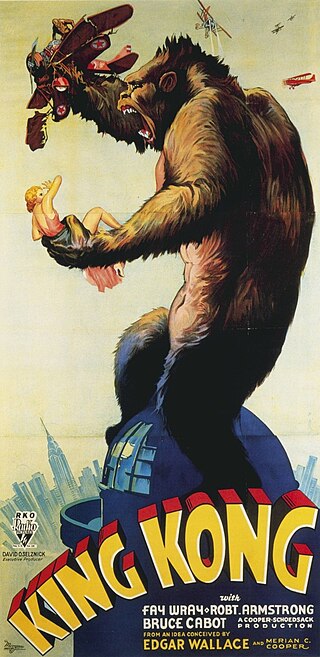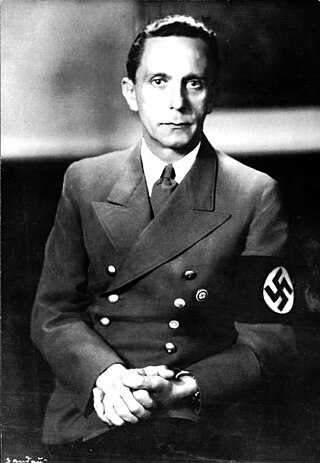
King Kong is a 1933 American pre-Code adventure romance monster film directed and produced by Merian C. Cooper and Ernest B. Schoedsack, with special effects by Willis H. O'Brien and music by Max Steiner. Produced and distributed by RKO Radio Pictures, it is the first film in the King Kong franchise. The film stars Fay Wray, Robert Armstrong and Bruce Cabot. The film follows a giant ape dubbed Kong who is offered a beautiful young woman as a sacrifice.

The 1930s was a decade that began on January 1, 1930, and ended on December 31, 1939. In the United States, the Dust Bowl led to the nickname the "Dirty Thirties".

Maximillian Oppenheimer, known as Max Ophüls or simply Ophuls, was a German-born film director who worked in Germany (1931–1933), France, and the United States (1947–1950). He made nearly 30 films, the latter ones being especially notable: La Ronde (1950), Le Plaisir (1952), The Earrings of Madame de… (1953) and Lola Montès (1955). He was credited as Max Opuls on several of his American films, including The Reckless Moment, Caught, Letter from an Unknown Woman, and The Exile. The annual Filmfestival Max Ophüls Preis in Saarbrücken is named after him.

Jean-Louis Xavier Trintignant was a French actor. He made his theatrical debut in 1951, and went on to be regarded as one of the best French dramatic actors of the post-war era. He starred in many classic films of European cinema, and worked with many prominent auteur directors, including Roger Vadim, Costa-Gavras, Claude Lelouch, Claude Chabrol, Bernardo Bertolucci, Éric Rohmer, François Truffaut, Krzysztof Kieślowski, and Michael Haneke.
The following is an overview of 1933 in film, including significant events, a list of films released, and notable births and deaths.

Primo Carnera, nicknamed the Ambling Alp, was an Italian professional boxer and wrestler who reigned as the boxing World Heavyweight Champion from 29 June 1933 to 14 June 1934. He won more fights by knockout than any other heavyweight champion in boxing history.

Harry Warren was an American composer and the first major American songwriter to write primarily for film. He was nominated for the Academy Award for Best Original Song eleven times and won three Oscars for composing "Lullaby of Broadway", "You'll Never Know" and "On the Atchison, Topeka and the Santa Fe". He wrote the music for the first blockbuster film musical, 42nd Street, choreographed by Busby Berkeley, with whom he would collaborate on many musical films.

Der Sieg des Glaubens is the first Nazi propaganda film directed by Leni Riefenstahl. Her film recounts the Fifth Party Rally of the Nazi Party, which occurred in Nuremberg, Germany, from 30 August to 3 September 1933. The film is of great historic interest because it shows Adolf Hitler and Ernst Röhm on close and intimate terms, before Hitler had Röhm killed during the Night of the Long Knives on 1 July 1934. As he then sought to remove Röhm from German history, Hitler ordered all known copies of the film be destroyed, and it was considered lost until a surviving copy was found in the 1980s in East Germany.

Alessandro Blasetti was an Italian film director and screenwriter who influenced Italian neorealism with the film Quattro passi fra le nuvole. Blasetti was one of the leading figures in Italian cinema during the Fascist era. He is sometimes known as the "father of Italian cinema" because of his role in reviving the struggling industry in the late 1920s.

Telefoni Bianchi films, also called deco films, were made by the Italian film industry in the 1930s and the 1940s in imitation of American comedies of the time in a sharp contrast to the other important style of the era, calligrafismo, which was highly artistic. The cinema of Telefoni Bianchi was born from the success of the Italian film comedy of the early 1930s; it was a lighter version, cleansed of any intellectualism or veiled social criticism.
A list of some notable films produced in the Cinema of Italy ordered by year and decade of release For an alphabetical list of articles on Italian films see Category:Italian films.

Mario Soldati was an Italian writer and film director. In 1954, he won the Strega Prize for Lettere da Capri. He directed several works adapted from novels, and worked with leading Italian actresses, such as Sophia Loren and Gina Lollobrigida.

The Reich Ministry for Public Enlightenment and Propaganda, also known simply as the Ministry of Propaganda, controlled the content of the press, literature, visual arts, film, theater, music and radio in Nazi Germany.

Gino Corrado was an Italian-born film actor. He appeared in more than 400 films between 1916 and 1954, almost always in small roles as a character actor. From 1916 to 1923, he was known as Eugene Corey, which was an Anglicized version of his name.

The Mezzalama Trophy is an Italian high altitude ski mountaineering competition in upper Valtournenche and Ayas valleys, in Aosta Valley.

Yes, Mr Brown is a 1933 British musical comedy film directed by Herbert Wilcox and starring Jack Buchanan, Hartley Power, Elsie Randolph and Margot Grahame. According to the Idaho Falls Post Register, the film was "gay catchy...entertainment with plenty of light comedy", in which "the manager of the Viennese branch of a large American toy firm [played by Buchanan] sets out to entertain his visiting boss [played by Power] in an effort to win a partnership." Yes, Mr. Brown is currently missing from the BFI National Archive, and is listed as one of the British Film Institute's "75 Most Wanted" lost films.

The Società Italiana Cines is a film company specializing in production and distribution of films. The company was founded on 1 April 1906.
Milena Salvini was an Italian-born French exponent and teacher of Indian classical dance. Especially known for her services to Kathakali, in 2019 she was awarded India's fourth highest civilian award, the Padma Shri.
















